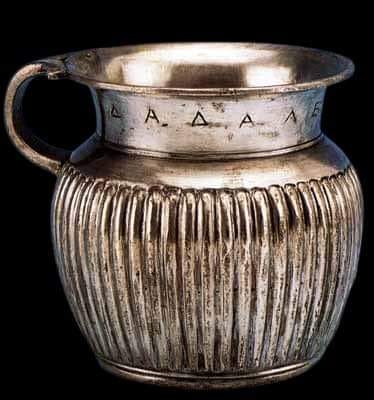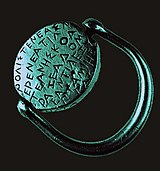(picture by Stability AI)
Okay, I'm pulling the trigger. I'm going to start serializing my novel Wealthgiver in October, which means I have to stop fiddling with the sound-change spreadsheet and start translating actual text for the book.
In order to keep myself on track, I'm posting my translations here as well as a bit of background. Which are your favorites?
Enza "var" tse "Brie."
They are "mountain" and "Mountain."
This comes from the foreword, in which I explain the distinction between two Bessian words, both of which I have translated into English as "mountain." Var is based on the "or-" in real Thracian place-names such as the river Orosines ("mountain curves?") Dysoron ("bad mountain") and Órbēlos, a Paeonian mountain shrine.
Brie is based on the well-attested Thracian word bría, present today at the end of the name of the city of Nesebar (classical Mesēmbría). The word originally meant "city," but the modern Bessians have only one settlement: a secret underground temple carved into a mountain.
Enza Rudopa Var tse Im Var.
They are the Rhodopes and the Balkans.
The Rhodope Mountains and the Balkans are plural in English but singular in Bessian (and not coincidentally Bulgarian). "Balkan" is a Turkish word, meaning "frontier," but the range's Greek name was Haemus. The Greeks had legends about a queen named "Red Face" (rhodo-opē) and a king named "Blood" (haîm-us), but those are just puns based on the Thracian "Red Water" (Rodē Apē) and "Old" (Haimos). Note that the "Red water" etymology is well-established and the "old" etymology is my own theory.
You can amuse yourself with figuring out which of the above words mean "are" and "and."
Brieta esta.
It is The Mountain.
That's a postposed article. Gotta have postposed articles in the Balkans.
Sarata tse Plistarass
The Maiden and the Wealthgiver.
Both of these names are serendipitous. At coffee with one of my generous Thracologist contacts, I said that one of my character's names might be the Thracian equivalent of korē. Maybe "zarva"? No, said my informant, it would be sara. And I looked at the sound changes and so it was.
Plistarass is even more a stroke of luck. I originally thought the name of the Thracian god Darzelas meant "give-gold" and equated it to the Greek Ploutodótēs and Ploutodotḗr. I wrote it all into the novel, but when I went deeper into the language, it didn't work. Darzelas comes from a different root entirely, but it just so happens there's another Thracian deity called Pleistoros, and wouldn't you know it, the Proto-Indo-European roots that in Greek produced plouto-dotḗr, might well have resulted in Thracian pleis-toros. Phew. Rewrites averted.
Tamssata
Darkness
In my book, the secret cave-Thracians have many words for "darkness." This one is the good kind - utterly pitch-black, where it is impossible for the eyes to deceive and inner truth becomes apparent. This word is based on Tamasidava, a Dacian settlement. It might not have meant "dark town," but then again, it might have.
This one's my favorite word this week. I love the way it sounds.
Da, dela mi.
Earth, protect me.
There is a real collection of silver pitchers with "DADALEME" written in Greek letters around their necks. There are many theories as to what that might mean, but I'm going with Da, dale me. Da would be the same as the first element in Greek Demeter. The modern Bessian words are a bit different, of course, because of sound shifts ;)
Bessé! Vas tan vu disam!
Good! I receive you.
The word for "I" deserves some attention. The ring of Ezerovo is one of the very few extant Thracian inscriptions, and the only one whose writing is clear and complete. Of course, it's anyone's guess what it actually means. The writing (in the Greek alphabet with no breaks between words) is "ROLISTENEASNERENEATILTEANĒSKOARAZEADOMEANTILEZYPTAMIĒERAZĒLTA." One of the big controversies in the world of Thracology is whether the beginning of this message breaks down into "Rolisteneas Nerenea" or "Rolistene Asn Ere Nea." I used to subscribe to the first theory, but another inscription and my sound-change spreadsheet makes the second look more likely. Here, "Rolistene" is someone's name in the vocative (Rolisten!) and "asn" is the first person singular pronoun "I."
The reason I didn't like "asn" as "I" was because this word is used by Bulgarian nationalists to construct a fictional ancestry for themselves as direct descendants of the Thracians, with Bulgarian being a Paleobalkan rather than a Slavic language. I go out of my way here to denounce this theory as poppycock. The fact that the Bulgarian word for "I" is az is not evidence that Bulgarian inherited that word from Thracian. Bulgarian and Thracian are both Indo-European languages, and they both applied the same Satem sound shift to the Proto-Indo-European root *eǵHóm (also the ancestor of Greek egṓ, Sanskrit ahám and German Ich).
Or almost the same sound shift. In Bulgarian and other Slavic languages, PIE *ǵ became /z/. On the Ezerovo ring, however, the sound is written <s>. I think that's because of a sound shift that Thracian went through that Slavic didn't: Grimm's law.
Grimm's law is named after the famous Brothers Grimm, and explains the differences between Germanic words like father and Latin words like pater. In the field of Thracology, it's known by its German name, the awesome Lautverschiebung, and it's another area of controversy. If Grimm's law did apply to Thracian, then PIE *ǵ would have become proto-Thracian *dz then Grimm's-law *ts, which became Thracian /s/. The <n> at the end of <asn> would be from PIE *om, which when un-accented became /ən/. The scribe didn't bother to write that little "uh" sound, which, based on the other inscriptions seems to have been a general practice. My speculative sound-shifts turned asn into vas.
That just leaves one thing: the Thracians' name for themselves. My beta-readers will know that the Cave-Thracians of my book call themselves "the Good." This is based on the name of the Bessi, a tribe who really lived in the Western Rhodopes where my fictional story takes place. It's my theory that their name is derived from PIE *h₁wes-, the origin of Greek ēǘs, Iranian beh, and the first element in the name of the Visigoths. The Bessi vanish from history in the sixth century AD, but in my book, that's only what they wanted you to think! Turns out they've just been hiding this whole time, waiting for their chance to strike.
More next week.
Dan






